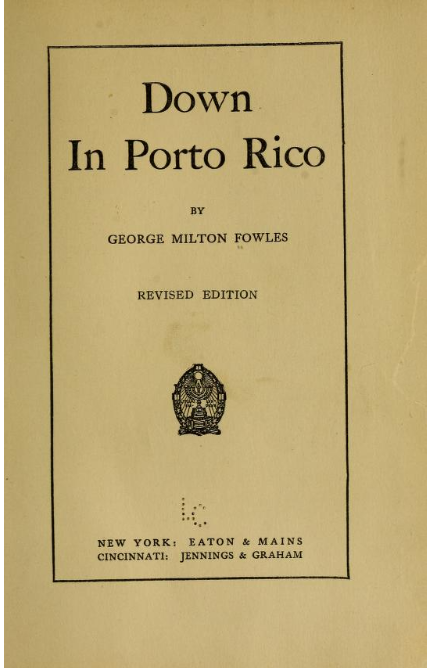
This source is an excerpt from George Milton Fowles’s book Down in Porto Rico originally published in 1906. Fowles explains that the book is intended not as a history of Puerto Rico, but as a “picture of Porto Rican life as it now exists.” In the foreword, Fowles explains that he spent a year on the island studying the people of Puerto Rico in order to help usher in a “brighter day to […] our fellow-citizens” (Fowles, foreword). From this foreword, we as readers are able to gather a few things about the author. First, we are able to ascertain that he is an American. Second, readers are able to detect some bias toward Puerto Rico in Fowles’s statement that Americans need to help usher in a brighter future for Puerto Ricans. In this statement, it is clear that he does not believe Puerto Ricans are able to help themselves. The foreword of the book nicely sets up the excerpt from Down in Porto Rico included below. This section is taken from the chapter entitled “Morals and Religion” and reflects on the effect of Protestantism on the people of Puerto Rico. In this section, Fowles is praising the effects that American Protestant missionaries have had on Puerto Ricans. In these praises, racist stereotypes and anti-Catholic sentiments are visible.
Down in Porto Rico offers a perfect example of an American citizen who supports Protestant missionaries and their work on the island because they are interested in spreading American influence. Fowles makes explicit references to Puerto Rico as a part of the United States and credits Protestant missionary work as crucial to changing the Puerto Rican people to be more American so that they will be more easily adopted into the imperial fold.
“To raise a high moral standard of this kind among people who had been used to impurity of life in its priesthood, among the so-called higher classes, and quite generally among the lower classes, required great moral courage. One of the highest tributes that can be paid to the Porto Rican people is that they have responded to these appeals to their noblest nature, and the standards thus set up have called forth the devotion and loyalty of many thousands of Porto Ricans who show by their lives that they are earnestly striving to live up to this higher life that has been opened to their view.
So energetic have the missionaries been Progress in extending their work, and so eager have the people been to receive them, that there is not a city or large town and not many villages where Protestant services are not held regularly.
That Protestantism is having a strong influence in developing character is evident on all sides. Men who were given to drinking rum have become total abstainers. Gamblers have been changed into honest men. Great changes have taken place among men and women with respect to the kind of language they use and to truthfulness of speech. Greatest of all, high standards of morality have been set up that are having a wonderful influence in attracting the people from the filth of social impurity to the beauty of a pure life. Through Protestant agencies, assisted and strengthened by the general diffusion of knowledge, Porto Rico is rapidly being regenerated, and her children will soon be as intelligent and as moral as those of any other part of the Great Republic.” (Pages 123-124)
Sources
Fowles, George Milton. Down in Porto Rico. [New York, Eaton & Mains: Cincinnati, Jennings & Graham, 1910] Image. Retrieved from the Library of Congress, <www.loc.gov/item/10002968/>.